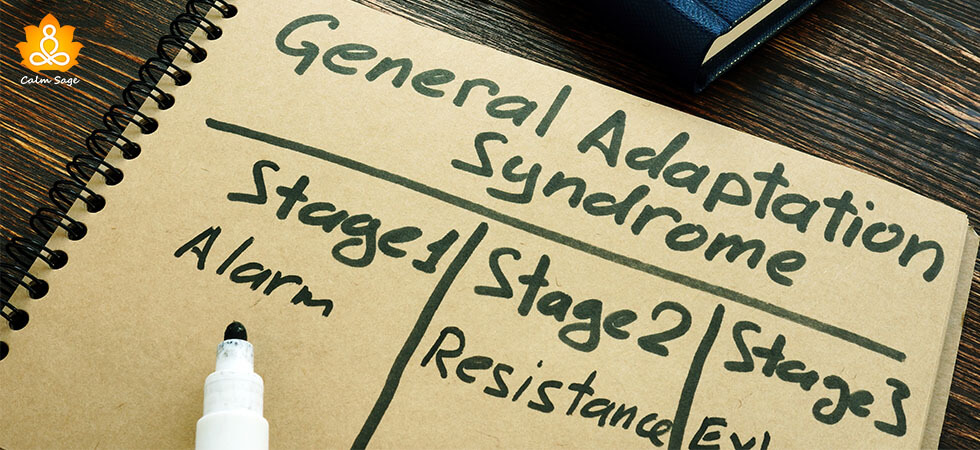General Adaptation Syndrome: Stages & Examples

General adaptation syndrome, you all must have experienced this many-a-times by now. I will give you an example of General adaptation syndrome, you have a very important meeting scheduled for today and you suddenly start having a sharp headache or stomach ache or you start to feel nauseous, etc.
Happened to you before? Well, this is because of general adaptation syndrome. Whenever you experience stress your body responds to it through automatically generated physical symptoms like some kind of aches or vomiting or regular unstoppable yawning, etc.
It is very, very common and most of us have experienced it a lot many times but just didn’t know the name of this weird reaction of our body. General adaptation syndrome, if not addressed on time can have long lasting negative effects.
Let’s understand General adaptation syndrome better…
What Is General Adaptation Syndrome?

General adaptation syndrome (GAS) was first described by Hans Selye, a psychologist and a scientist, in the year 1936. General adaptation syndrome is considered one of the pioneering researches in modern biological formulation of stress.
General adaptation syndrome can be described as the physiological symptoms which are generated by your body automatically when the body is in stress. Basically whenever you experience stress your body automatically reacts through physical symptoms.
So, the shivering you experience when you are about to step on the podium and share an idea for a new project to your investors is because of General adaptation syndrome.
Let’s look at the stages of General adaptation syndrome before we jump onto the symptoms and signs….
Stages Of General Adaptation Syndrome With Examples…
Stage 1- Alarm Reaction Stage
The alarm reaction stage is the first stage of General Adaptation Syndrome (GAS). In this stage your body generates the first reaction to stress. Once you have encountered stress and your brain has received the signal, it will alarm your body.
To do so, your brain generates adrenaline and glucocorticoids, which are the flight and flight hormones. These prepare your body to identify the threat and create an action plan to protect yourself.
Let’s understand this with the help of an example of General Adaptation Syndrome (GAS)…
Example: You have an important presentation in 10 minutes and your heart rate starts to increase, there is shivering, sweating and your body temperature rises. These are the physiological reactions to stress that you are experiencing at that point.
Stage 2- Resistance Stage

The resistance stage comes after the alarm reaction stage of General Adaptation Syndrome (GAS). You enter this stage only when the stressor or the trigger has left. In this stage your body tries to come back to a normal state.
Your blood pressure begins to come down, your palpitations have decreased and your adrenaline has also gone down. Although you do not reach a completely resting phase because your body is still very alert and can go back to the first stage of General Adaptation Syndrome (GAS) if the stress is triggered again.
Let’s understand the resistance stage of General Adaptation Syndrome (GAS) with the help of an example :
Example: You have finished your presentation now and you are sitting in the meeting room listening to other presentations. You still feel the pump in your blood but it’s all slowly reducing. Your breathing has become normal but you still remember the the shock you body was in during the first stage of General Adaptation Syndrome (GAS)
Stage 3- Exhaustion Stage
Exhaustion stage of General Adaptation Syndrome (GAS) is known as the riskiest stage of General Adaptation Syndrome (GAS). It occurs only when you experience prolonged stress. If you are in stress for a really long time you are most likely to enter the exhaustion stage after experiencing both 1 & 2 stages of General Adaptation Syndrome (GAS).
In this stage your body is completely exhausted and tired and can no longer fight and combat the stress anymore. Even if the stressor is still present your body enters the exhaustion stage because you do not have any remaining strength to fly back.
This stage is dangerous because the exhaustion stage is the one in which you can develop some health issues or long lasting negative consequences.
Example: Your bosses are never happy with your presentations. They always ask you to make some changes and are always rude and judgmental towards you. The entire office starts mocking you. By each passing presentation you start getting tired and finally you can’t take the stress anymore so you decide to present whatever you have ready with you.
Signs Of General Adaptation Syndrome (GAS)

General Adaptation Syndrome (GAS) can easily be identified by physical symptoms of stress. Let’s have a look at them according to each stage of General Adaptation Syndrome (GAS)
Here you go…
Stage 1- Alarm Reaction Stage
- Increased blood pressure
- Increased palpitation
- Your pupils dilate
- You face flushes
- You are in high alert
Stage 2- Resistance Stage
- You feel frustrated
- Irritated
- Can’t seem to concentrate on anything
Stage 3- Exhaustion Stage
Now that you are aware of the stages and symptoms of General Adaptation Syndrome (GAS), let’s quickly look at how to cope with General Adaptation Syndrome (GAS) before we end the blog…
Ways To Cope With General Adaptation Syndrome (GAS)
Here are a few ways you can manage your General Adaptation Syndrome (GAS)
- Take good care of your eating habits. Eat a balanced diet on time every day. What you eat reflects on your mood so keep it balanced.
- Exercising regularly can improve your mood and help in reducing stress.
- Learn some breathing techniques and practice themregularly, this is very helpful during stage 1 of General Adaptation Syndrome (GAS)
- Identify your triggers and try to stay away from them or get rid of them completely (if you can)
- Journalingcan also help with General Adaptation Syndrome (GAS) because you can express your feelings and emotions rather than bottling them up.
That’ll be all for General Adaptation Syndrome (GAS)!
I hope you found this blog interesting. Do let us know about your experiences with General Adaptation Syndrome (GAS), What stage of General Adaptation Syndrome (GAS) affects you the most and how you deal with General Adaptation Syndrome (GAS)?
Thanks for reading!
Take care and stay safe.




















